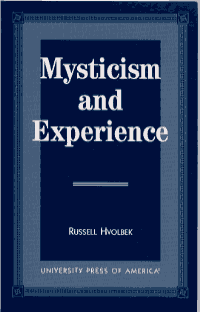 |
| Russell Hvolbek, Mysticism and Experience, (Lanham, Maryland: University Press of America, 1998), paper, 127 pp.
Reviewed by Arthur Versluis, Michigan State University Since this little book takes as its primary subject the works of Jacob Böhme, it is only natural that we should consider it in Esoterica. As the title would suggest, Mysticism and Experience is not an historical study but a work about the nature of what the author terms "mystical experience," of which he has evidently had several. But although I think it is important to consider the pivotal works of Böhme from a variety of perspectives that include consideration of the nature of consciousness (in keeping with the experiential nature of Böhmean theosophy itself), this particular book could have used a careful and knowledgeable editor. Initially, I was delighted to see a new book on Böhme that sought to approach him from an avowedly experiential side rather than from a purely historical angle. And Hvolbek does discuss the general outlines of Böhme's work, including the characteristic theosophic schema according to which there are three principles in the cosmos: the divine, eternal nature, and the natural or external world. What is more, he includes some valuable eighteenth-century theosophic illustrations that do aid in understanding what Böhme sought to convey. However, from the beginning I saw some potential difficulties in the book, beginning with the word "mysticism" itself. Böhme's work is better described as "theosophic," not only because theosophy is the term used by the later members of the Böhmean school, but even more because we can define theosophy rather clearly, whereas the terms "mystical" or "mysticism" are so fuzzy as to be almost indefinable. And the author refers on occasion to "spiritualism" when clearly he means "spirituality." These are merely matters of terminology, of course, and perhaps not critical; but there are other places that the book could use judicious development or editing. Hvolbek's discussion of Böhme's complex terminology and cosmology could stand some amplification, particularly as regards central concepts like "eternal nature", and one longs for more close analysis of Böhme's own writing. |
||
|
|
||
| Perhaps most importantly, Hvolbek could jettison the attempt to apply an overlay of modern evolutionary theory to Böhme's perspective: not only is this anachronistic, it leads to serious distortions of what Böhme had to say.
These remarks aside, however, it is good to see a book in which an author seeks to grapple with Böhme's writings. Even if the book is not particularly successful, it is at least commendable for the effort, not least because it suggests an attempt to explore an area that deserves serious investigation: how Böhmean theosophy intersects with consciousness studies. This is an area that will not quickly be exhausted. |
||